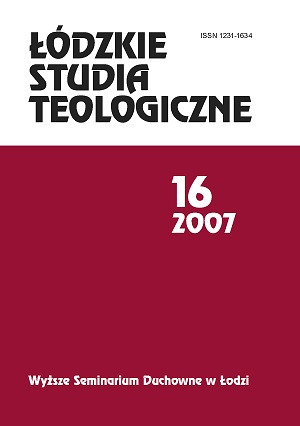Sekularyzacja w perspektywie socjologii
Secularisation in sociological perspective
Author(s): Waldemar KulbatSubject(s): Christian Theology and Religion, Political Philosophy, Governance, Politics and religion, Social Theory, Sociology of Religion
Published by: Wyższe Seminarium Duchowne w Łodzi
Keywords: Secularization; Church; sociology;
Summary/Abstract: Secularisation – a controversial concept because of its distinct use in different disciplines, such as philosophy, social sciences, theology, canon law (Lübbe). Even in the social sciences, various levels of analysis of the religious situation result in different definitions and divergent evaluations of the situation. Later generations of sociologists continued to employ the term but attached different meanings to it (Shiner). Not until the 1960s were several theories of secularization developed, most prominently by Peter Berger, Thomas Luckmann, and Bryan Wilson. These theories subsequently led to discussion concerning the existence and validity of such a „theory” (Hammond, Hadden, Lechner, Bruce). Other sociologists have systematically analyzed existing theories because some discussions failed to scrutinize the ideas, levels of analysis, and arguments of those being criticized. Tschannen has suggested treating secularization theories as a paradigm, and Dobbelaere has stressed the need to differentiate between levels of analysis, suggesting convergences and divergences between theories. The current treatment is dependent upon Tschannen's „exemplars” of the secularization paradigm and refers to authors who have extensively written about them, without suggesting, however, that they were the only ones to do so. The exemplars are ordered according to the levels of analysis (macro, or societal, level; meso, or subsystem, level; and micro, or individual, level). Some exemplars are renamed, and one is added: institutional differentiation or segmentation (Luckmann), autonomization (Berger), rationalization (Berger, Wilson ), societalization (Wilson), disenchantment of the world (Weber, Berger), privatization (Berger, Luckmann), generalization (Bellah, Parsons), pluralization (Martin), relativization (Berger ), this-worldliness (Luckmann), individualization (Bellah et al.), decline of church religiosity (Martin). According to Tschannen, three exemplars are central to the secularization paradigm: differentiation, rationalization, and this-worldliness. The other exemplars are related to these. For the last 20 years, one can observe in many countries of the Western world a return to an interest in religion. The various trends of „spiritualization”, esotherism and mysticism quite often outside the official structures of Christianity. The crisis pertains, however, to Christianity in its traditional structures and functions. Secularisation does not follow a one-way track in social development, nor it is an irreversible trend. The renaissance of various form spirituality is always possible, including the desecularisation process.
Journal: Łódzkie Studia Teologiczne
- Issue Year: 16/2007
- Issue No: 1
- Page Range: 125-131
- Page Count: 7
- Language: Polish

